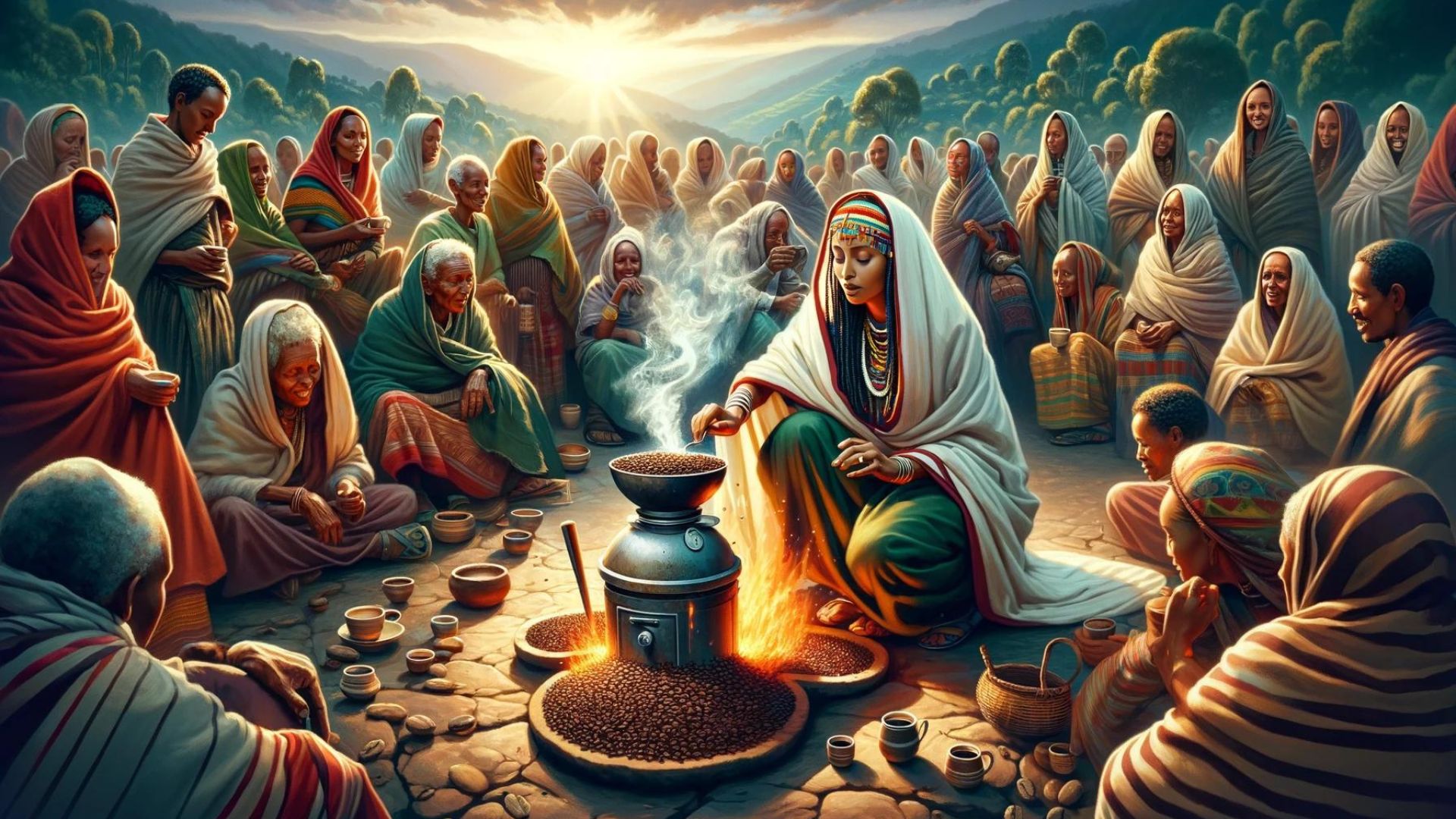The Coffee Ceremony and Its Social Importance in Ethiopia
In Ethiopia, coffee isn’t just a drink; it’s a way of life. It’s woven into the fabric of society, a ritual that brings people together, fosters conversation, and marks life’s milestones. The Ethiopian coffee ceremony, known as “Jebena Buna,” is a time-honored tradition that holds deep social and cultural significance.
Imagine this: Lush green coffee beans are meticulously roasted over hot coals, their tantalizing aroma filling the air. The beans are then ground by hand, often with a traditional mortar and pestle. The grounds are placed into a beautiful clay pot called a jebena, which has a bulbous base and a narrow neck, then filled with water and brought to a boil over an open fire.
The coffee ceremony is almost always led by a woman, who often wears traditional Ethiopian attire. She acts as the hostess, her movements graceful and precise as she prepares the coffee. It’s a performance as much as a beverage preparation. While the coffee brews, guests may be offered incense to enjoy its sweet fragrance.
Finally, it’s time for the coffee. Small, handleless cups are arranged on a tray, sometimes with fresh grasses scattered beneath them. The hostess pours the rich, dark coffee in a continuous stream from a height, a testament to her skill. No spoons are necessary – sugar is usually added directly to the cups beforehand.
But the ceremony isn’t just about the first cup. Tradition dictates at least three rounds called Abol, Tona, and Bereka. Each round holds symbolism, the first awakening the spirits, the second encouraging blessings, and the third offering the deepest blessing.
More than anything, the Ethiopian coffee ceremony is about community. It’s a time to slow down, connect with friends and neighbors, and discuss matters big and small. News is shared, advice is given, and laughter fills the air. To refuse a coffee invitation is considered rude; it’s an experience meant to be shared. Just picture yourself relaxing with friends, surrounded by the heady scent of coffee, engaged in a lively conversation.
The Ethiopian proverb, “Buna dabo naw” (Coffee is our bread), emphasizes the centrality of coffee to daily life. It’s a symbol of hospitality, respect, and a reminder of the simple things that bind a community together. Imagine being a traveler in Ethiopia, welcomed into a home and offered a coffee ceremony – it would be an act of kindness and a connection you wouldn’t soon forget.
So next time you sip your morning coffee, take a moment to imagine the rich tradition and symbolism behind it. Embrace the idea of making the time and space for connection and conversation with those you care about. Let the aroma of freshly brewed coffee inspire not just your senses but also your heart.
Why Should You Care?
- Cultural Appreciation: Learning about the Ethiopian coffee ceremony offers a window into another culture’s traditions, promoting understanding and respect for diversity.
- The Power of Ritual: Understanding this tradition reminds us of the importance of simple rituals that bring people together and create a sense of community.
- Inspiring Your Own Traditions: The Ethiopian coffee ceremony can inspire you to create your own meaningful rituals for connection with loved ones.
Key Takeaways
- Coffee as a Cultural Cornerstone: The Ethiopian coffee ceremony showcases how deeply ingrained coffee is in Ethiopian culture and daily life.
- Hospitality and Community: The ceremony emphasizes the value of sharing, hospitality, and creating space for connection.
- Symbolism in Ritual: There’s meaning in each step of the ceremony, with the three rounds of coffee holding special significance.
- The Experience, Not Just the Drink: The ceremony highlights that it’s not just about the coffee, but the process, the aroma, and the company.
Keywords
- Ethiopian Coffee Ceremony: A traditional ritual of preparing and drinking coffee, deeply rooted in Ethiopian culture.
- Jebena Buna: The Ethiopian name for the coffee ceremony (“jebena” means coffee pot, “buna” means coffee)
- Jebena: The distinctive clay pot with a bulbous base and narrow neck used for brewing coffee.
- Abol, Tona, Bereka: The three traditional rounds of coffee served during the ceremony, each with its own symbolic meaning.
- Hospitality: The act of welcoming and generously offering food, drink, and a place to rest – central to the coffee ceremony.
- Ritual: A sequence of actions with symbolic meaning, often performed on special occasions.
- Community: A group of people living together in one place or sharing common characteristics or interests.
- Aroma: A distinctive, usually pleasant smell.
- Incense: A substance that produces a sweet smell when burned, used in ceremonies for its fragrance.
- Tradition: A belief, custom, or way of life passed down within a group or society.
Frequently Asked Questions
- How long does a coffee ceremony take? A ceremony can last from around an hour to several hours depending on the occasion and number of guests.
- Do I need special equipment for the ceremony? While the traditional jebena is beautiful, it’s not essential. You can recreate the spirit with any coffee pot.
- Where can I experience a coffee ceremony outside of Ethiopia? Many Ethiopian restaurants worldwide offer coffee ceremonies, or you can find resources online to host one at home.
Myth Buster
- Myth: The Ethiopian coffee ceremony is solely about caffeine.
- Reality: While the coffee is delicious, the ceremony centers around the social aspect – connection, conversation, and honoring tradition.
Let’s Talk
- Have you ever participated in a ritual from another culture? How did it make you feel?
- What rituals do you have in your own life for connecting with others (even if they seem small)?
- If you could create a new ritual for community, what would it involve?
Let’s keep the conversation going in the comments below!












0 Comments